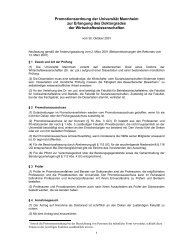The returns to cognitive and non-cognitive abilities in Germany
The returns to cognitive and non-cognitive abilities in Germany
The returns to cognitive and non-cognitive abilities in Germany
Create successful ePaper yourself
Turn your PDF publications into a flip-book with our unique Google optimized e-Paper software.
We argued above that a worker’s <strong>cognitive</strong> ability <strong>and</strong> her personality become<br />
observable <strong>to</strong> the employer only over time. We therefore estimate additional regressions<br />
<strong>in</strong>clud<strong>in</strong>g variables that <strong>in</strong>teract cognition or personality with tenure. 17<br />
With respect <strong>to</strong> openness, the HTIV results now suggest that the ma<strong>in</strong> effects are not<br />
different from zero but that the jo<strong>in</strong>t effects evolve with tenure (Table 4, columns 2 <strong>and</strong> 4).<br />
<strong>The</strong> f<strong>in</strong>d<strong>in</strong>g for males <strong>in</strong>dicates that <strong>in</strong> the presence of a significant negative ma<strong>in</strong> effect of<br />
be<strong>in</strong>g open <strong>to</strong> experience, this would be outweighed after approximately 5 years, after which<br />
openness would be rewarded <strong>in</strong> terms of higher wages. Apart from that, <strong>non</strong>e of the<br />
rema<strong>in</strong><strong>in</strong>g jo<strong>in</strong>t effects of FFM traits <strong>and</strong> tenure play a role once unobservable heterogeneity<br />
is accounted for.<br />
[Table 4 about here]<br />
Individuals’ external locus of control is aga<strong>in</strong> penaliz<strong>in</strong>g <strong>in</strong>asmuch as the ma<strong>in</strong><br />
effects imply wage differentials of about 7% for females <strong>and</strong> 5% for males <strong>in</strong> the panel<br />
models. On <strong>to</strong>p of that, the results from the <strong>in</strong>teraction terms, albeit not statistically<br />
significant, suggest for male workers that this penalty <strong>in</strong>creases with tenure which might<br />
further reflect some k<strong>in</strong>d of self-re<strong>in</strong>forc<strong>in</strong>g psychological effects over time. For <strong>cognitive</strong><br />
<strong>abilities</strong>, we f<strong>in</strong>d neither ma<strong>in</strong> effects nor jo<strong>in</strong>t effects with tenure for both males <strong>and</strong> females<br />
<strong>in</strong> the pooled OLS models. <strong>The</strong>re however are positive ma<strong>in</strong> effects for males <strong>in</strong> the panel<br />
regressions, imply<strong>in</strong>g a wage premium of about 5%.<br />
Robustness checks<br />
We ran additional regressions as robustness checks but do not provide them <strong>in</strong> detail,<br />
s<strong>in</strong>ce the results from these exercises are not substantially different from those given above.<br />
First, we estimated our models based on workers from West <strong>Germany</strong> only. <strong>The</strong> <strong>in</strong>tention is<br />
<strong>to</strong> take <strong>in</strong><strong>to</strong> account that East Germans tend <strong>to</strong> have a higher external locus of control<br />
25















